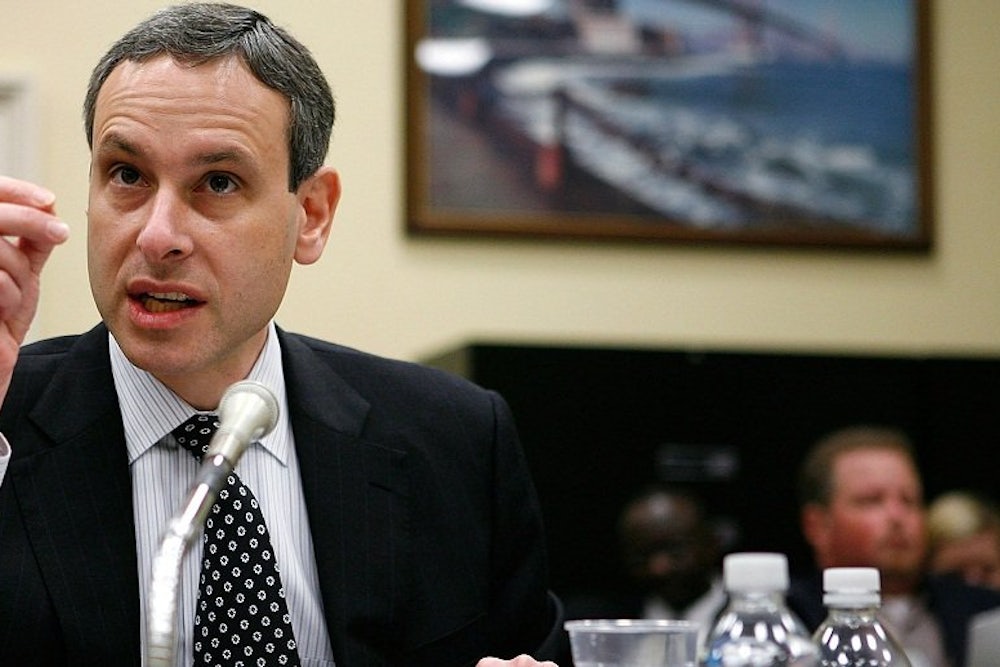There was some initial Beltway confusion this week in the search for a larger, unifying meaning to justify our monomaniacal coverage of the scandal trifecta. The scandals showed that Barack Obama was too political. No, they showed that he was not political enough. (These two ran side by side in the same publication.) They showed that he was a power-hungry Nixon redux; they showed that he was an impotent bystander. But gradually a consensus has emerged: The implication of the scandals is that, taken together, they undermine the case for government, which grievously injures the president, party, and political philosophy that require people to have faith in government’s ability to do good. This is now the received wisdom passed down from the ultimate arbiters.
This doesn’t hold up to scrutiny. Two of the scandals are pretty easy to dismiss from this formulation. It’s becoming less and less clear just what the scandal is around Benghazi, and to the extent that grave mistakes were made there, they involved a government that had insufficient reach when it mattered. The subpoena of Associated Press phone records raises troubling questions about the administration’s security-state mindset, but as New York Magazine's Jonathan Chait has noted, this is very distinct from the critique of big government that conservatives and pundits are trying to knit here: After all, it was Republicans who demanded the administration investigate the Yemen-related leak that is likely at the heart of the records seizure.
The scandal where the new narrative seems most apt is, of course, the IRS' targeting of conservative groups. But it, too, does not sustain a grand indictment of government’s capacity to do its job. Saying it does requires overlooking a rather basic distinction: between fundamentally sensible or even half-sensible laws and regulations, and unworkable and absurd ones. It also means overlooking how the laws and regulations that were being so buffoonishly enforced in this instance came about.
As Bloomberg View's Josh Barro and others have pointed out, it was ridiculous in the first place that employees of the Internal Revenue Service, whose job is to, you know, collect revenue, were engaged in the practice of doing something completely different: determining whether politically-minded groups were engaging in election-related activities with more or less than 50 percent of their time and money. This does not at all excuse the seemingly slanted way the employees approached their task; but it does help explain why they were spending so much of their time on such laughably Dilbertesque work, with endless questionnaires seeking to determine the exact nature of the groups seeking 501(c)(4) status. Taken to their bureaucratic extreme, the hazy regulations around 501(c)(4)'s would inevitably produce such nitpicking questions of the groups.
But does this suggest, as the new Beltway narrative holds, that all government and bureaucracy is doomed to such sorry ends? That, for instance, it’s insane to entrust this same agency with the task of helping manage the new health care law?
No. And it takes some serious chutzpah to argue otherwise. The laws and regulations that the Cincinnati crew so haplessly tried to enforce were not the result of a liberal dream agenda. They were the result of a triumphant conservative assault on a campaign finance system that has prevailed since the 1970s. 501(c)(4)s have emerged as the latest way to skirt limits and disclosure requirements for campaign contributions, an end-around that was given a big boost by recent court rulings, including Citizens United. If many big-government liberals had their way, there would be no office in Cincinnati vetting 501(c)(4)s at all because they would not exist in anything like their current form. How do we know this? Because there was a vote in Congress to force disclosure of major donors (those giving more than $10,000) to 501(c)(4)s, and most Democrats voted for it. Forcing donor disclosure would greatly reduce the appeal of that tax exemption, and would thereby reduce the need for civil servants to sift through filings and send out time-consuming, inane questions. But the Disclose Act was blocked by Republican opposition.
In other words, not all laws and regulations are liberal children. Unless we’re planning on a libertarian dream-world, there are going to be laws on the books, and getting rid of or gutting one law doesn’t mean leaving no law in its stead; it usually means being left with a different and possibly worse one. The one that the Cincinnati crew was trying to enforce was of decidedly mixed political parentage. One could argue that all campaign finance laws are doomed to failure—in fact, Republicans used to argue something close to this when they made the case for unfettered, fully disclosed contributions, a “let it all hang out” approach. But led by Senate Minority Leader Mitch McConnell, they have backed off of this to their current ardent defense of non-disclosure. Thus the 501(c)(4) morass.
Yes, government has it in its DNA to be mind-bendingly bumbling and wasteful and petty. That’s why we have reporters and institutional checks to raise a hue if things get out of hand. But does the bizarro stuff going on in Cincinnati pose some kind of grand challenge to the liberal project? No, because the grand liberal project didn’t want government doing that particular task to begin with.
I should add here: If the IRS finds itself hopelessly incapable of handling its part of implementing Obamacare—which it just might, not least because it says it is woefully short of resources to the task—that is another matter. Then we can have a serious discussion about the limits of technocratic liberalism. But indicting liberalism for the failures of 501(c)(4) enforcement is like saying you won’t go to a restaurant anymore because the chef is a lousy singer. It’s passing judgment on the wrong grounds.
Alec MacGillis is a senior editor at The New Republic. Follow Alec on Twitter @AlecMacGillis
